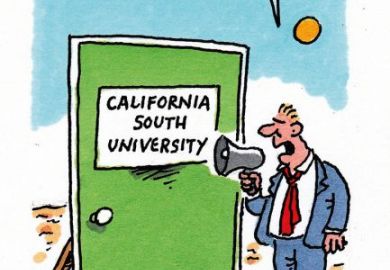
He has already said “sorry”, but the vice-chancellor of the Open University now faces a vote of no confidence over his claim that the institution’s distance learning model had allowed academics “to get away with not being teachers for decades”. In a filmed discussion with students, Peter Horrocks said that it was “ridiculous” that scholars at the OU’s Milton Keynes headquarters were “spoken about as teaching” when they were creating learning materials that were often delivered by associate lecturers. “That’s not teaching,” he said, adding: “The people who work here should be bloody well teaching; they should be teaching directly.” With Mr Horrocks already facing academics’ ire over plans to cut jobs and courses, the University and College Union said that its members would vote on 5 April on a motion calling on him to resign immediately. Recalling the time when the chairman of a jewellery chain described his products as “total crap”, UCU regional official Lydia Richards described Mr Horrocks’ comments as “something straight out of the Gerald Ratner handbook”.
Is an end to UK higher education’s pensions strike in sight? As Times Higher Education, went to press, UCU members were being balloted on proposals aimed at ending the dispute. The deal offered by Universities UK would preserve the element of the Universities Superannuation Scheme at the heart of the row – defined benefits, which guarantee members a set income in retirement – while an expert panel considers the valuation of the fund. Many UCU members remain dissatisfied with the deal on offer, not least because there are questions over whether any alternative valuation produced by the panel would be accepted by the USS, which believes that a £6.1 billion shortfall needs making up. If the deal is rejected, the 65 institutions involved in the dispute face another 14 days of walkouts, starting at some campuses on 16 April.
Cynics might think that Theresa May’s review of English higher education funding is motivated less by concern about mounting student debt and more by fears about the votes of undergraduates’ concerned parents and grandparents. Now, in what might be seen as a sign that Middle England is turning against tuition fees, the Archbishop of Canterbury has added his voice to the debate. “I think [university] should be paid for by taxation and not by tuition fees,” Justin Welby told student journalists at Canterbury Christ Church University. “People like me…didn’t pay tuition fees, and the vast majority of people came away from university feeling like the country had given them something and they owed it. If you’ve paid for it, you’ve bought it, it’s yours – why should you care about anyone else?”
The review of free speech in UK higher education by Parliament’s Joint Committee on Human Rights was published on 27 March, reporting that claims that “censorious” students have created a “free speech crisis” on campuses were “exaggerated” and “clearly out of kilter with reality”. The national media headlines that accompanied the report might have come as a surprise, then: “‘Intolerance’ threat to university free speech”, said the BBC; “Free speech at universities ‘being shut down’” was Sky News’ take; while The Guardian went for “Safe spaces used to inhibit free speech on campuses, inquiry finds”. In the report, MPs and peers concluded: “Any inhibition on lawful free speech is serious, and there have been such incursions, but we did not find the wholesale censorship of debate in universities which media coverage has suggested.” Still, their finding seems unlikely to change the tone of the media’s coverage any time soon.
That said, followers of the “safe space” debate and the history of student protests and occupations may have been surprised to find members of the National Union of Students “occupying” their own national conference last week. The event had to be suspended when large numbers of delegates took over the main stage, protesting against the truncation of debate on welfare motions covering abortion rights in Northern Ireland and the decriminalisation of sex work. The conference eventually got under way again after union leaders offered to hold a special national executive committee meeting to vote on the two motions. Elsewhere at the event, it was business as usual, with president Shakira Martin and vice-president (higher education) Amatey Doku securing re-election.
Register to continue
Why register?
- Registration is free and only takes a moment
- Once registered, you can read 3 articles a month
- Sign up for our newsletter
Subscribe
Or subscribe for unlimited access to:
- Unlimited access to news, views, insights & reviews
- Digital editions
- Digital access to THE’s university and college rankings analysis
Already registered or a current subscriber?



